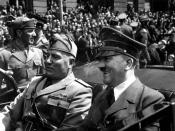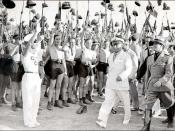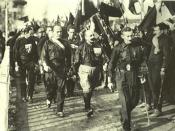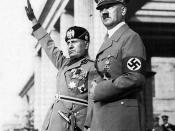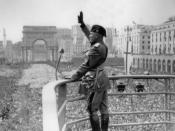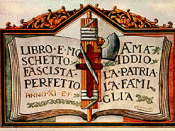Mario und der Zauberer was written in 1929 at which time the Fascist regime led by Mussolini was firmly in place in Italy. This is where the book is set. Thomas Mann's audience, though, was in Germany where fascist tendencies were rising because of widespread resentment of economic chaos since the end of the First World War and by appealing to the feelings of anger at the country's defeat. Although this story can essentially be read without specifically picking up on its political meaning, contemporary readers would probably be familiar with the political situation in Italy and Germany and would therefore recognise it.
Right from the beginning of the story the narrator gives us a hostile and sinister picture of Torre di Venere. He uses words like unangenehm, ÃÂrger, Gereizheit, and ÃÂberspannung to show that visitors to this tourist resort are conscious of an oppressive sense of uneasiness. These are the effects of Fascism and they cause the narrator and his family to encounter hostility towards them in various situations due to the fact that they are foreigners.
In Mussolini's Italy there was an ever-increasing hostility towards foreigners due to the self-assertive nationalism felt among Italians. Mann gives us concrete examples of this in Mario und der Zauberer, for example the treatment of the family in the Grand Hotel. They are booked into this very hotel for three or even four weeks yet when they ask the waiter if they can sit on the veranda for dinner they are told:'dass jener anheimelnde Aufenthalt "unsere Kundschaft", "ai nostri clienti", vorbehalten sei.'They are obviously outraged as they are paying customers at this hotel. What the waiter means by nostri clienti are Italien guests. Foreigners are treated like second class citizens even though they are financially supporting this tourist area. Another event in the hotel adds to the hostility experienced by the family. This time the Italian aristocrats staying in the room next door complain about the son's whooping cough. He actually just has the remains of the illness and is in no way infectious but the aristocrats seem to be of the opinion that 'der Keuchhusten sei akustisch ansteckend und einfach für ihre Kleinen das schlechte Beispiel fürchtete.' A doctor even declares the cough as harmless but nevertheless the family must move to the 'Dependance Wohnung', outside the hotel. The Italians, and especially the upper class Italians, are given complete preference, even if their claims are not sustainable. Outside the hotel the family continues feeling the strong patriotism of the Italians. The narrator tells us:'Tatsächlich wimelte es am Strande von patriotischen Kindern, - eine unnatürliche und niederschlagende Erscheinung. Kinder bilden ja eine Menschenspezies und Gesellschaft für sich, sozusagen eine eigene Nation'.
The Italian children have been so influenced by the political regime that they readily quarrel with children from other countries, even through the language barriers. They talk about 'der GröÃÂe und Würde Italians' and have apparently been led to believe that they are more important than other nationalities. This shows how Fascism was something that affected everyone in Italy. Children are especially important because they symbolise the future of the regime.
The family unknowingly cause a scandal on the beach of Torre di Venere. This happens because they allow their eight year old daughter to take off her bathing suit in order to rinse it in the sea. She is only naked for a short moment and of course the family did not think that they were doing anything wrong:'Hätten wir die Welle von Hohn, AnstoÃÂ, Widerspruch voraussehen müssen, die ihr Benehmen, unser Benehmen also, erregte?'The narrator gives his daughter freedom which contrasts with the attitudes of the repressed Italians on the beach. They lie on the beach fully dressed. We are told of one man in 'städtischem Schniepel, den wenig strandgerechten Melonenhut im Nacken...'. This freedom is turned upon and the family are told that they have misused Italy's hospitality and honour. The people are extremely over-sensitive and inform the authorities who judge the offence as 'molto grave'. The family have to pay a fine of fifty lire. In this scene we are again shown the values and attitudes of ordinary Italians influenced by Mussolini. Their freedom to do as they please has been taken away to the extent that they believe that their repressed state is the only acceptable and decent way of living. The fact that the Italians act as a crowd here is also important. It is better to join the crowd than to effectively oppose the fascist regime as this could result in personal danger. The acceptance of the view of the crowd is like the acceptance of a dictatorship which relies upon the compliance and passive behaviour of its people. Under totalitarian rule only those who obey their leader's orders are "free" individuals and this beach scene, albeit on a smaller scale, seems to hint at this political idea.
Mann uses Cipolla, the magician, to further suggest a political meaning to the story.
When Cipolla first comes on stage he evokes laughter from the audience because of his crippled physique. This soon changes and by the end of the night most of the audience are at his bidding. Although he is physically weak he is able to exercise power on a spiritual level and this gives him the qualities of a leader. He is able to fascinate the audience by his commentaries that are malicious and full of conceit, but at the same time clever and amusing:'"Die Freiheit existiert, und auch der Wille existiert; aber die Willensfreiheit existiert nicht, denn ein Wille, der sich auf seine Freiheit richtet, stöÃÂt ins Leere. Sie sind frei, zu ziehen oder nicht zu ziehen. Ziehen Sie aber, so werden Sie richtig ziehen, - desto sicherer, je eigensinniger Sie zu handeln versuchen."'Cipolla is a master of language. He could be seen as symbolising a dictator who acts as the mouthpiece of a nation.
Cipolla makes explicit references to patriotic politics. As he introduces himself, he says:'"ich habe einen kleinen Leibesschaden zu beklagen, der mich auÃÂerstand gesetzt hat, am Kriege für die GröÃÂe des Vaterlandes teilzunehmen."'He regrets that his physical disability prevented him from fighting for his country, and the idea of expansion was obviously very important in a fascist country. Another reference to patriotic politics is when he gets volunteers from the audience to assist him in writing some arithmetic. When he finds out that his volunteers cannot write he gets angry:'"Skandalös", sagte er kalt und verbissen. "Geht an eure Plätze! Jedermann kann schreiben in Italien, dessen GröÃÂe der Unwissenheit und Finternis keinen Raum bietet."'He goes on to say that they are an embarrassment to themselves and to their country to let this be known in front of foreigners. The fascist regime depends on its image of its population being strong and well provided for, even though this might not be the truth, as it is not in this case. To let it be known that the government does not provide education for every person in the country makes us doubt the strength and functionality of the regime with respect to the lower classes. One more reference to patriotic politics is when Cipolla greets Mario with the fascist salute and praises him for bearing a name following the nation's heroic traditions:'"Mario, sehr gutâ¦Ein verbreiteter Name, einer von denen, die die heroischen ÃÂberlieferungen des Vaterlandes wach erhalten. Bravo. Salve!" Und er streckte Arm und flache Hand aus seiner schiefen Schulter zum römischen Gruàschräg aufwärts.'Although Cipolla hypnotises members of the audience and forces them to do things against their own free will, they do not leave. The people cannot resist the compulsion of a magician and fascination prevents them from leaving:'Unsere Gefühle für Cavaliere Cipolla waren höchst gemischter Natur, aber das waren, wenn ich nicht irre, die Gefühle des ganzen Saales, und dennoch ging niemand weg.'In this respect Cipolla is again playing the role of a dictator. He is controlling the "will" which gives him an uncanny mastery of the crowd who do not leave him just because of sheer curiosity.
Cipolla uses his hypnotic skills to reduce audience members to the status of mere marionettes doing his bidding. But, some people do try and stand up to him. A man from Rome challenges the hypnotist to make him dance against his will. Although he puts up a brave struggle, he succumbs in the end. Cipolla says:'"Wer wird sich so quälen? Nennst du es Freiheit - diese Vergewaltigung deiner selbst? ... Da, du tanzt schon! Das ist kein Kampf mehr, das ist bereits das Vergnügen!"'The man from Rome seems much more at ease when he finally gives in to Cipolla's will, so Cipolla describes him as being free. It is like succumbing to a dictator just to avoid problems but at the same time having to trade in your free will in the process. In a totalitarian society this is what happens, and unless someone is brave enough to stand up against the regime, it stays in power. Mario, to our surprise, is the one who is willing to do this. The humiliation that Cipolla forces him to suffer turns him, a friendly and ordinary character, into a murderer. He effectively assassinates the dictator.
I do not think that Mann is using his character Cipolla to portray a specific dictator, but more to show the effects of dictatorship in general. He shows what sort of people can become powerful and how the general public react to this power held over them. I feel that the disquieting atmosphere in Torre di Venere and the horrific evening at the theatre are supposed to reflect life under a dictatorship. They are used as symbolism to allude to political points made by Thomas Mann.
BibliographyThomas Mann, Mario und der ZaubererRonald Speirs, Mann: Mario und der ZaubererThomas Mann: Two Stories ed. W. WitteHermann Kurzke, Thomas Mann. Epoche - Werk - WirkungRonald Gray, The German Tradition in Literature 1871 - 1945
